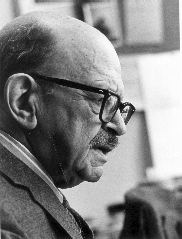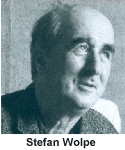| 1964 |
18-24 May: Attends
the 'Internazionale di Studi su l'Espressionismo' in Florence at the invitation
of Roman Vlad. At the music session on 20 May - chaired by H.H.
Stuckenschmidt - delivers a 'performance paper' on Weill and
Expressionism: a collage of brief spoken texts - some quoted, some
original - juxtaposed with sections from Weill's music for Strindberg's
historical play Gustav V, specially recorded at Aberdeen University by a
student orchestra conducted by Ian Kemp. From the chair, Stuckenschmidt
politely questions the notion of any significant link between Weill and
Expressionism. Among the musicians and scholars attending the conference are
Josef Rufer, Luigi Rognoni, Elliott Carter, and Luigi
Dallapiccola. The first of many meetings with Dallapiccola will have
important consequences in the years to come; the first and only meeting with
the philosopher Ernst Bloch is memorable, but has no bearing on the
essay D will write in 1984.
Begins work with Hugo F
Garten on a revision of the text of Die Bürgschaft - always
starting at the piano, and proceeding from a roughly underlaid English text to
a definitive German version. An early proponent of Georg Kaiser and (as H.F.
Koenigsgarten, a former member of his Berlin circle) Garten is a keen amateur
of music and had written the libretto of Mark Lothar's opera Lord Spleen
(1930). The work on Die Bürgschaft, undertaken with the
agreement of Universal Edition and with Lotte Lenya's moral support, occupies
several months, and is completed in a draft form which is set aside when a
production possibility falls through, and deadlines for the LIFE &
WORKS take priority.
|
| 1965 |
First three "Music Today"
releases (see Discography): Gerhard; Schoenberg, Lutyens,
Britten; Koechlin, Boulez, Messiaen
.
|
| 1966 |
4th "Music Today" release:
Skalkottas. In New York, renews acquaintance with Stefan
Wolpe.
Friedrich Verlag (Hannover)
publish 'Caspar Neher', a large and finely produced volume edited
by Gottfried von Einem and Siegfried Melchinger. Among the
contributions (which include tributes, essays and recollections by Brecht,
Walter Felsenstein, Heinz Hilpert, Egon Monk, Oscar Fritz Schuh, Carl Orff,
Rolf Liebermann, Fritz Kortner, and Rudolf Wagner-Régeny) is an
anonymous translation of an essay by David Drew entitled Neher and
Weill (pp 96-100). Edited and translated without consultation or
submission of proofs, the published version omits all comments considered
insufficiently respectful of Brecht; and it appears under the name 'Daniel
Drew'. For Brecht, the Daniel Drew of history had been a symbol of rampant
American capitalism and its villainies. As treasurer of the Erie Railroad, Drew
(1797-1879) and his two accomplices defrauded and robbed the shareholders on a
massive scale. Exposed and declared bankrupt three years before his death, the
founder of the Drew Theological Seminary was "noted for his mixture of
Methodist piety… with illiteracy, extreme thrift, and a grasping and
unscrupulous nature" (Oxford Companion to American
Literature).
 |
|
May: In the USA
for Weill work. Visits Stefan Wolpe. At the Juilliard School in New
York, attends a production of the opera The Trial of Lucullus by
Roger Sessions. Proceeds to Boston for discussions with Little, Brown,
and returns to Europe by sea from there to Lisbon. Attends at the Lisbon Opera
House a production of the opera La Spinalba (1739) by the Portuguese
composer and pupil of Alessandro Scarlatti, Francisco Antonio de Almeida, and
is greatly taken with it. For The New Statesman D reviews both La
Spinalba and The Trial of Lucullus. The latter review is the
occasion for an all-too-slight tribute to a composer who, over the past decade,
has figured increasingly in D's deliberations. The disagreement between
Wolpe and Gerhard at their first and only meeting in the early
1960s had been fundamental and perhaps inevitable. But the Sessions of the
Princeton years had come to represent for Drew as for many others an essential
equilibrium. |
|
| 1967 |
January: Following
Karl Miller's resignation as Literary Editor of The New
Statesman, Drew offers his own resignation - which the editor, Paul
Johnson, accepts with alacrity. His final contribution to The New
Statesman's music column, on 27 January, is a piece on Charles Koechlin and
Kipling's monkeys. |
|

